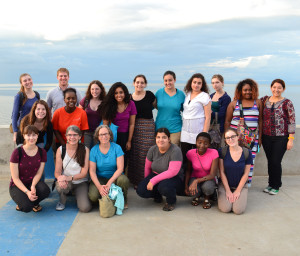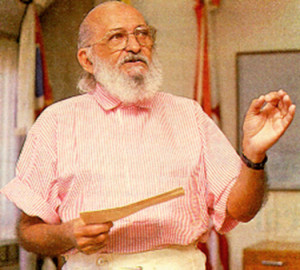“One cannot expect positive results from an educational or political action program which fails to respect the particular view of the world held by the people. Such a program constitutes cultural invasion, good intentions notwithstanding.” ~Paulo Freire
During several occasions on our delegation to Nicaragua, I was reminded of Paulo Friere, whose writings I studied extensively in a class at Haverford College. Though we studied his work through the lens of education, Friere was–in addition to an educator –a philosopher and social movement theorist. I witnessed his sensibility incorporated into many of the programs and services we learned about in Nicaragua. Considering that Friere’s philosophy is equally applicable to political and social action, it isn’t surprising that many of the activists we met mentioned Freire’s work as a guiding inspiration.
Although I have seen his educational philosophy in practice in the classroom, the delegation to Nicaragua expanded my understanding of Frierean principles as they relate to solidarity work and social action; in particular, NGOs and activists fighting for women’s empowerment and health.

Bryn Mawr & Haverford College participants of the Reproductive Health and Justice Delegation in Nicaragua
I noticed this theme starting on day-one of our delegation, at the Acahualt Women’s Center. Acahualt is located in Acahualinca, one of Managua’s poorest neighborhoods. It was decimated in the 1972 earthquake, and the process of rebuilding the area has been slow. Most families in the neighborhood are headed by single mothers, who are solely responsible for the economic stability of the household, childcare, and other daily tasks. The Center was started in 1991 when founders Maria Elena Bonilla, Silvia Cizneros, and Norma Villalta saw uterine and cervical cancers affecting women in the area in alarmingly high numbers. Since these cancers can be avoided with early detection, they set up a clinic in a neighbor’s home to provide screenings for women.
Now, over two decades later, the Center has expanded to provide psychological support and therapy to women in abusive relationships, tubaligations (though due to a newly restricted budget, these are no longer available), a preschool, and legal support for women who have experienced domestic violence.
How did they decide which programs to implement and where to expand services? By talking to the women of Acahualinca. The residents directly informed the founders about which services they wished to access. This provided a framework of goals and a trajectory of development for the Center. In this way, the founders of Acahualt broke the traditional power structure between providers and beneficiaries, which results in charity work. Instead, they strove to incorporate the wishes of the local women into the creation of their program, a praxis of solidarity.
By listening and responding to the community, the Acahualt Women’s Center is an important center for women’s health and an emblem of hope and progress. The success of their programs is a direct consequence of the Center’s outreach model, which relies on the wants of the women they serve to inform program development. This is precisely what Friere argues in the opening quote I presented; education and/or social change programs will not be impactful unless they are informed by the particular worldview and sensibility of those who they serve. Opening up a dialogue between the providers and the beneficiaries of a program is essential to effecting change. I think, and I believe Friere would also argue, that a relationship of this nature fosters an environment where both the provider and the beneficiary unite to learn from each other and work together for social change.
The driver for social action is the common humanity we feel with others and the desire to learn from and work side-by-side with those who share our passions and goals.

